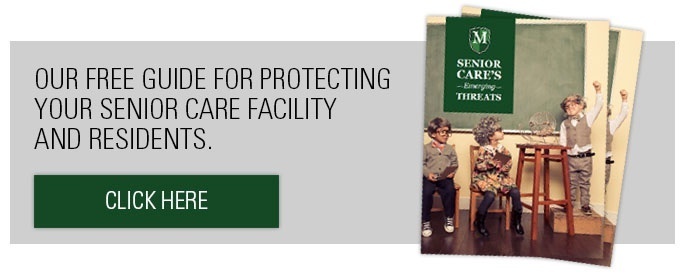When it comes to caring for their elderly patients, senior care centers can’t take any risks.
Although many do their best to provide top-notch care to their residents, sometimes problems can arise and accusations of senior abuse can rattle an institution. Whether a worker was acting with malicious intent or care inadvertently grew negligent over time, it is important that elder care facilities have the proper insurance to protect themselves from liability. This is critical because the risk of elder abuse is greater than facility administrators might think.
Here are a few of the risk factors associated with unintentional elder care abuse:
Poor stress management
If a senior care facility worker is going through a hard time at home, they might bring it into the office. With an employee’s mind wandering, it is possible that he or she will neglect their responsibilities with patients, which could result in claims of elder abuse if it goes on for too long. In the event that caregivers aren’t able to correct a patient care issue before it becomes too big, having insurance is a nice safety net for facilities to have if they are dealing with accusations of elder abuse.
Substance abuse
Ideally, care facility administrators will catch any signs of substance abuse and remove employees from patients as soon as possible. Unfortunately, that doesn’t always happen, which means an employee might be taking care of patients hung over or under the influence of drugs or alcohol. This could easily lead to negligent care, especially with higher-risk patients who deal with illnesses such as dementia or Alzheimer’s.
Transmission of violence
If a caregiver was abused as a child, there is a higher likelihood that they will continue the cycle of violence by mistreating the elderly patients they are put in charge of, according to researchers from Webster University. Not everyone who has experienced abuse themselves will go on to be an abuser themselves, but it is important for employers to be aware of any risk factors that might affect patient care. If employers are aware of any past abuse their employees have endured, it would be smart to check in with that employee regularly to ensure that proper care and treatment is getting administered at all times.
History of depression
Caregivers who have been diagnosed with depression might be more likely to neglect patient responsibilities, leading to a lapse in care, according to Help Guide. To help cut off any potential problems before they grow, care providers should have an extensive knowledge of their employee’s mental health needs so they can help them deliver the highest-quality care possible. Leaving this to chance might result in poor patient care or a lawsuit if things get out of hand.
Although senior care center employees strive to provide the best help they can, things don’t always work out. To make sure that one mistake doesn’t cost ruin an entire facility, elderly care centers should strongly consider the benefits of senior care insurance.
Brokers and agents who partner with McGowan Program Managers gain access to robust Senior Care Insurance policies that can provide the necessary coverages these facilities need. With the “Power of the Pen,” McGowan provides tailor-made insurance coverage that best suits each individual senior care facility.



